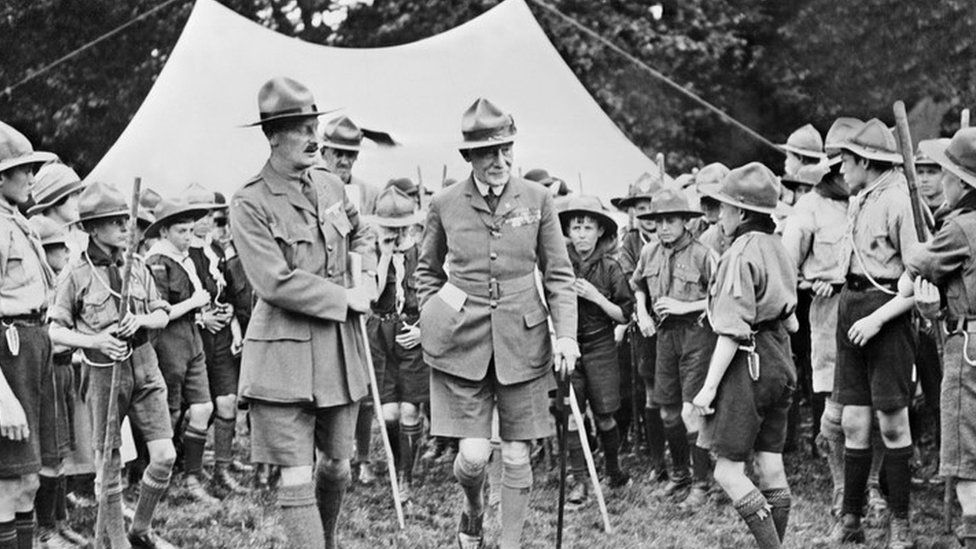Was Robert Baden-Powell a supporter of Hitler?
- Published

A council has said it may temporarily remove a statue of Robert Baden-Powell from public view after critics accused the Scout movement founder of racism.
Former Labour parliamentary candidate Corrie Drew said he was homophobic and "an enthusiastic supporter of Hitler".
The website Topple the Racists said he committed "atrocities against the Zulus in his military career".
However, some historians have argued the allegations are either unfair or entirely unfounded.
'Nazi sympathies'
In 2010, declassified MI5 files revealed that Baden-Powell held talks in 1937 with the head of the Hitler Youth movement and was invited to meet Adolf Hitler himself.
Lord Baden-Powell's biographer Tim Jeal said any admiration for the Nazi leader was confined to their shared ideas about boys' education.
The author said a diary entry in which Baden-Powell described Hitler's autobiographical manifesto Mein Kampf as a "wonderful book" had been misinterpreted.
Mr Jeal said: "It was all to do with the outward bound life - it was only these references to character-training that he found appealing, not Hitler's hatred of Jews.
"Baden-Powell condemned Hitler for being a megalomaniac and for mounting what he called 'huge pageants for hypnotising his people'.
"He hated totalitarianism, twice hoped that he would be able to marry Jewish women and chose a Jewish doctor."
Historian Dr Andrew Norman said the Nazis vowed to execute Baden-Powell in the event of a successful invasion of Britain.
He said: "He wanted to introduce the Scout movement into Germany to foster friendship between the two countries.
"His efforts were in vain, and for his pains he was put on a Nazi death list because the Germans suspected he was using scouts as spies."
'War atrocities'
Baden-Powell's exploits as an army officer in South Africa involved several controversial incidents.
His early military career was clouded by an operation to track down Zulu rebels in 1888, which led to at least three deaths.
Mr Jeal said: "He lost control of his men who may well have committed murder.
"Even if he had given orders to spare the rebels' lives, it's incredibly unlikely that his Zulu mercenaries would have obeyed.
"A lot of trouble stemmed from this and he was lucky not to lose his career."
Baden-Powell was later accused of executing an African chief in 1897 who had been promised his safety in return for surrendering.
Mr Jeal said: "This is probably the most damaging charge made against Baden-Powell.
"White settlers were being murdered in a remote part of Matabeleland. Baden-Powell had orders to capture the chief, Uwini, thought to be responsible and suppress his rebellion.
"Because the chief was wounded during capture and Baden-Powell doubted he would survive a long journey to the Cape to face a civil court, he court-martialled him on the spot.
"The verdict was death, so he was shot. Baden-Powell had exceeded his orders."
At the turn of the century, Baden-Powell was acclaimed a hero for his defence of the South African town of Mafeking during the Second Boer War.
His biographer said: "The worst that is normally said about him is that he starved 2,000 black Africans in Mafeking and stole their food to feed the white population.
"This is an absolute lie. He opened soup kitchens and shot all of his cavalry horses so that he could feed them."
'Romantic homosexual'
Baden-Powell spoke of the dangers of being "sentimental" about boys.
But Dr Norman said the Scouts founder was "confused about his own sexuality" and sometimes slept on a balcony to be away from his wife.
Mr Jeal said: "He was gay and repressed it. Men were beautiful to him but he was a romantic, not a practising, homosexual.
"If a scoutmaster was said to have either had a liaison with another master or was 'sentimental' about boys, he would remove them quietly, rather than call in the police.
"Everything he wrote about the attractiveness of men was in favour of a gay cause."
Related Topics
- Published11 June 2020
- Published9 December 2009